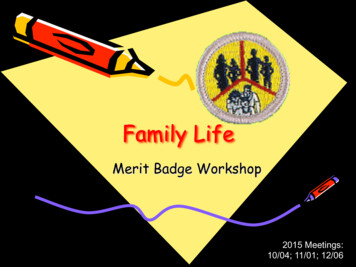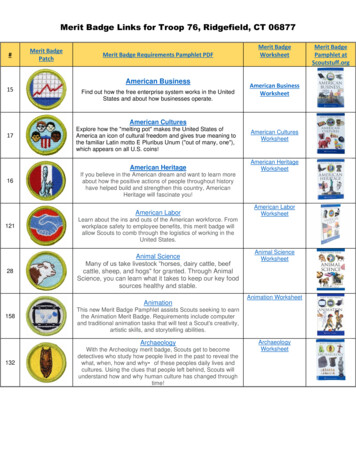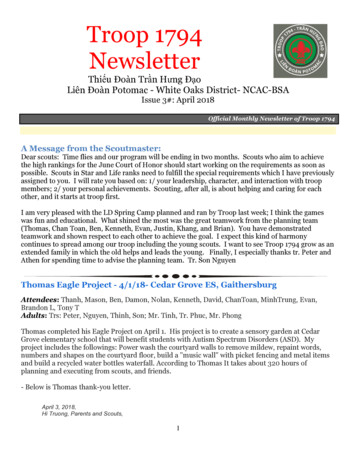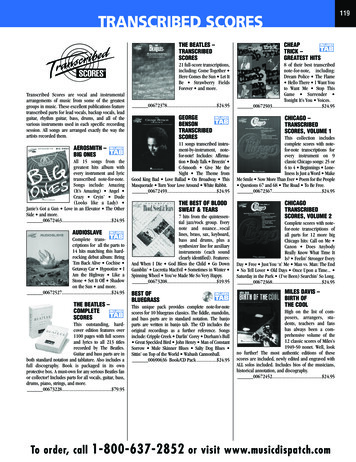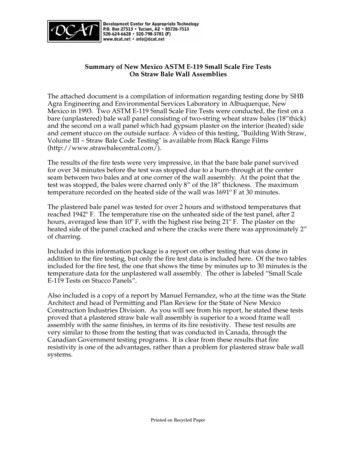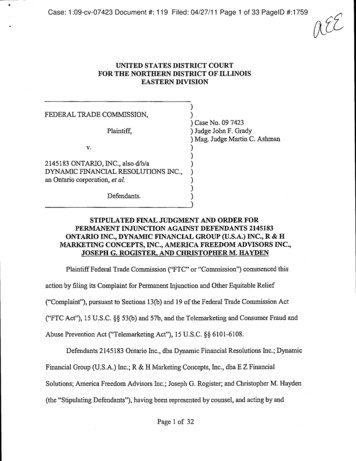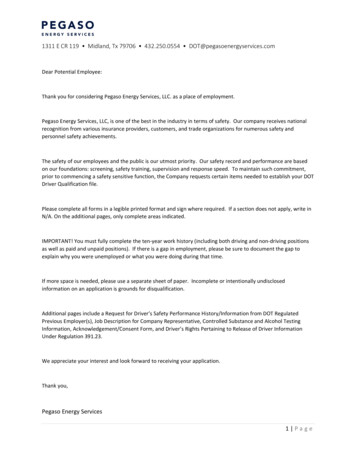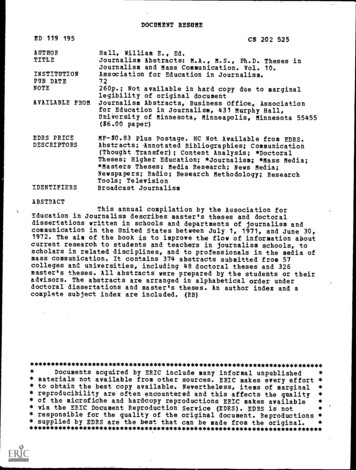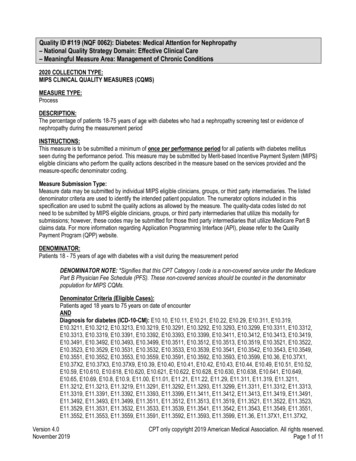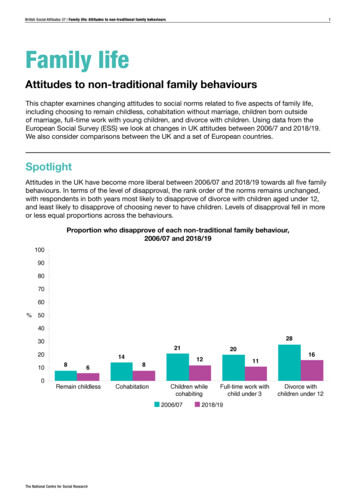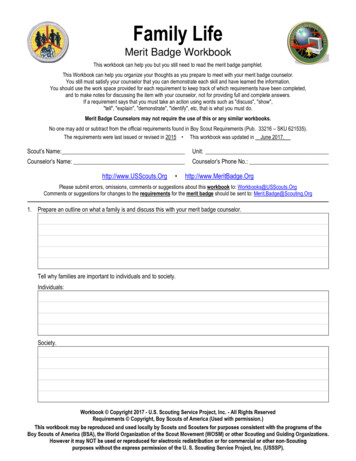
Transcription
Family LifeMerit Badge WorkbookThis workbook can help you but you still need to read the merit badge pamphlet.The work space provided for each requirement should be used by the Scout to make notes for discussing the item with his counselor, not forproviding the full and complete answers. Each Scout must do each requirement.No one may add or subtract from the official requirements found in Boy Scout Requirements (Pub. 33216 – SKU 620714).The requirements were last issued or revised in 2015 This workbook was updated in February 2015.Scout’s Name:Unit:Counselor’s Name:Counselor’s Phone No.:http://www.USScouts.Org http://www.MeritBadge.OrgPlease submit errors, omissions, comments or suggestions about this workbook to: Workbooks@USScouts.OrgComments or suggestions for changes to the requirements for the merit badge should be sent to: Merit.Badge@Scouting.Org1. Prepare an outline on what a family is and discuss this with your merit badge counselor.Tell why families are important to individuals and to society.Individuals:Society.Workbook Copyright 2015 - U.S. Scouting Service Project, Inc. - All Rights ReservedRequirements Copyright, Boy Scouts of America (Used with permission.)
Family LifeScout's Name:Discuss how the actions of one member can affect other members.2. List several reasons why you are important to your family and discuss this with your parents or guardians and with your meritbadge counselor.3. Prepare a list of your regular home duties or chores (at least five) and do them for 90 days. Keep a record of how often youdo each of them.Chore 1Chore 2Chore 3Chore 4Chore 5Chore 6(See the sample Home Chore Chart at the end of this workbook.)Discuss with your counselor the effect your chores had on your family.Family Life - Merit Badge WorkbookPage. 2 of 9
Family LifeScout's Name:4. With the approval of your parents or guardians and your merit badge counselor, decide on and carry out a project that youwould do around the home that would benefit your family.Submit a report to your merit badge counselor outlining how the project benefited your family.5. Plan and carry out a project that involves the participation of your family.After completing the project, discuss the following with your merit badge counselor:a. The objective or goal of the projectb. How individual members of your family participatedFamily Life - Merit Badge WorkbookPage. 3 of 9
Family LifeScout's Name:c. The results of the project6. Do the following:a. Discuss with your merit badge counselor how to plan and carry out a family meeting.b. After this discussion, plan and carry out a family meeting* to include the following subjects:1. Avoiding substance abuse, including tobacco, alcohol, and drugs, all of which negatively affect your health and wellbeing. Tobacco: Alcohol: Drugs:*This conversation may take place with only one or both of your parents or guardians.Family Life - Merit Badge WorkbookPage. 4 of 9
Family LifeScout's Name:2. Understanding the growing-up process and how the body changes, and making responsible decisions dealing withsex3. How your chores in requirement 3 contributed to your role in the family4. Personal and family finances5. A crisis situation within your familyFamily Life - Merit Badge WorkbookPage. 5 of 9
Family LifeScout's Name:6. The effect of technology on your family7. Good etiquette and manners:7.Discussion of each of these subjects will very likely carry over to more than one family meeting.Discuss the following with your counselor:a. Your understanding of what makes an effective father and why, and your thoughts on the father’s role in the familyWhat makes an effective father?Why?Family Life - Merit Badge WorkbookPage. 6 of 9
Family LifeScout's Name:The father’s role in the family:b. Your understanding of the responsibilities of a parentRequirement resources can be found ly Life#Requirement resourcesFamily Life - Merit Badge WorkbookPage. 7 of 9
Family LifeScout's Name:Sample Home Duty or Chore ListDuty 1Duty 3Duty 5Duty 2Duty 4Duty 6Week:Week:Week:Sun Mon Tue Wed Thu Fri Sat DaySun Mon Tue Wed Thu Fri SatDay: Sun Mon Tue Wed Thu Fri Sat DayDuty 1Duty 1Duty 1Duty 2Duty 2Duty 2Duty 3Duty 3Duty 3Duty 4Duty 4Duty 4Duty 5Duty 5Duty 5Duty 6Duty 6Duty 6Week:Week:Week:Sun Mon Tue Wed Thu Fri Sat DaySun Mon Tue Wed Thu Fri SatDay: Sun Mon Tue Wed Thu Fri Sat DayDuty 1Duty 1Duty 1Duty 2Duty 2Duty 2Duty 3Duty 3Duty 3Duty 4Duty 4Duty 4Duty 5Duty 5Duty 5Duty 6Duty 6Duty 6Week:Week:Week:Sun Mon Tue Wed Thu Fri Sat DaySun Mon Tue Wed Thu Fri SatDay: Sun Mon Tue Wed Thu Fri Sat DayDuty 1Duty 1Duty 1Duty 2Duty 2Duty 2Duty 3Duty 3Duty 3Duty 4Duty 4Duty 4Duty 5Duty 5Duty 5Duty 6Duty 6Duty huFriSatDay:DayDay Sun Mon Tue Wed Thu Fri SatDuty 1Duty 1Duty 1Duty 2Duty 2Duty 2Duty 3Duty 3Duty 3Duty 4Duty 4Duty 4Duty 5Duty 5Duty 5Duty 6Duty 6Duty 6Week:Day: Sun Mon Tue Wed Thu Fri SatDuty 1Duty 2Duty 3Duty 4Duty 5Duty 6Family Life - Merit Badge WorkbookEnter the dates for the weeks across the top of each block.Under the day of the week the duty is performed, enter a check mark or Xnext to the duty number. Each duty may not need to be done each day.Your parent or guardian may want to initial this chart each time duties arecompleted.Page. 8 of 9
Important excerpts from the Guide To Advancement - 2013, No. 33088 (SKU-618673)[1.0.0.0] — IntroductionThe current edition of the Guide to Advancement is the official source for administering advancement in all Boy Scouts of America programs: CubScouting, Boy Scouting, Varsity Scouting, Venturing, and Sea Scouts. It replaces any previous BSA advancement manuals, including AdvancementCommittee Policies and Procedures, Advancement and Recognition Policies and Procedures, and previous editions of the Guide to Advancement.[Page 2, and 5.0.1.4] — Policy on Unauthorized Changes to Advancement ProgramNo council, committee, district, unit, or individual has the authority to add to, or subtract from, advancement requirements. There are limitedexceptions relating only to youth members with special needs. For details see section 10, “Advancement for Members With Special Needs”.[Page 2] — The “Guide to Safe Scouting” AppliesPolicies and procedures outlined in the Guide to Safe Scouting, No. 34416, apply to all BSA activities, including those related to advancement andEagle Scout service projects.[7.0.3.1] — The Buddy System and Certifying CompletionA youth member must not meet one-on-one with an adult. Sessions with counselors must take place where others can view the interaction, or theScout must have a buddy: a friend, parent, guardian, brother, sister, or other relative—or better yet, another Scout working on the same badge—alongwith him attending the session.When the Scout meets with the counselor, he should bring any required projects. If these cannot be transported, he should present evidence, such asphotographs or adult verification. His unit leader, for example, might state that a satisfactory bridge or tower has been built for the Pioneering meritbadge, or that meals were prepared for Cooking. If there are questions that requirements were met, a counselor may confirm with adults involved.Once satisfied, the counselor signs the blue card using the date upon which the Scout completed the requirements, or in the case of partials, initialsthe individual requirements passed.Note that from time to time, it may be appropriate for a requirement that has been met for one badge to also count for another. See “Fulfilling MoreThan One Requirement With a Single Activity,” 4.2.3.6.[7.0.3.2] — Group InstructionIt is acceptable—and sometimes desirable—for merit badges to be taught in group settings. This often occurs at camp and merit badge midways orsimilar events. Interactive group discussions can support learning. The method can also be attractive to “guest experts” assisting registered andapproved counselors. Slide shows, skits, demonstrations, panels, and various other techniques can also be employed, but as any teacher can attest,not everyone will learn all the material.There must be attention to each individual’s projects and his fulfillment of all requirements. We must know that every Scout —actually andpersonally— completed them. If, for example, a requirement uses words like “show,” “demonstrate,” or “discuss,” then every Scout must do that. It isunacceptable to award badges on the basis of sitting in classrooms watching demonstrations, or remaining silent during discussions.It is sometimes reported that Scouts who have received merit badges through group instructional settings have not fulfilled all the requirements. Tooffer a quality merit badge program, council and district advancement committees should ensure the following are in place for all group instructionalevents. Merit badge counselors are known to be registered and approved. Any guest experts or guest speakers, or others assisting who are not registered and approved as merit badge counselors, do not accept theresponsibilities of, or behave as, merit badge counselors, either at a group instructional event or at any other time. Their service is temporary, notongoing. Counselors agree not to assume prerequisites have been completed without some level of evidence that the work has been done. Pictures andletters from other merit badge counselors or unit leaders are the best form of prerequisite documentation when the actual work done cannot bebrought to the camp or site of the merit badge event. There is a mechanism for unit leaders or others to report concerns to a council advancement committee on summer camp merit badge programs,group instructional events, and any other merit badge counseling issues—especially in instances where it is believed BSA procedures are notfollowed. See “Reporting Merit Badge Counseling Concerns,” 11.1.0.0. There must be attention to each individual’s projects and his fulfillment of all requirements. We must know that every Scout—actually andpersonally—completed them.[7.0.3.3] — Partial CompletionsA Scout need not pass all the requirements of one merit badge with the same counselor. It may be that due to timing or location issues, etc., he mustmeet with a different counselor to finish the badge. The Application for Merit Badge has a place to record what has been finished—a “partial.” In thecenter section on the reverse of the blue card, the counselor initials for each requirement passed. In the case of a partial completion, the counselordoes not retain his or her portion of the card. A subsequent counselor may choose not to accept partial work, but this should be rare. A Scout, if hebelieves he is being treated unfairly, may work with his unit leader to find another counselor. An example for the use of a signed partial would be totake it to camp as proof of prerequisites. Partials have no expiration except the Scout’s 18th birthday. Units, districts, or councils shall not establishother expiration dates for partial merit badges.[7.0.4.8] — Unofficial Worksheets and Learning AidsWorksheets and other materials that may be of assistance in earning merit badges are available from a variety of places including unofficial sourceson the Internet and even troop libraries. Use of these aids is permissible as long as the materials can be correlated with the current requirements thatScouts must fulfill. Completing “worksheets” may suffice where a requirement calls for something in writing, but this would not work for a requirementwhere the Scout must discuss, tell, show, or demonstrate, etc. Note that Scouts shall not be required to use these learning aids in order to complete amerit badge.Attachment(NOTE: It is not necessary to print this page.)Page 9 of 9
Family Life Scout's Name: _ Family Life - Merit Badge Workbook Page. 8 of 9 Sample Home Duty or Chore List Duty 1 Duty 2 . Varsity Scouting, Venturing, and Sea Scouts. It replaces any previous BSA advancement manuals, including Advancement Committee Policies and Procedures, Advancement and Recognition Policies and Procedures, and previous editions of the Guide to Advancement. [Page 2 .
